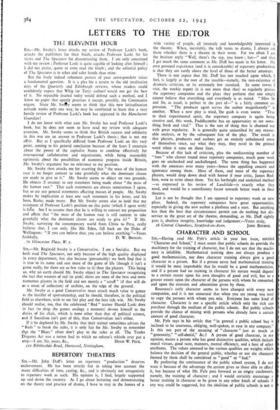TH2 ELEVENTH HOUR
LETTERS TO THE EDITOR
S1R,—Mr. Swaby's letter attacks my review of Professor Laski's book, attacks the publishers for their blurb, attacks Professor Laski for his views and The Spectator for disseminating them. I am only concerned with my review ; Professor Laski is quite capable of looking after himself ; 1 did not praise, quote or even read the blurb ; and the editorial policy of The Spectator is in other and safer hands than mine.
But the lively indeed vehement protest of your correspondent raises a fundamental question. It is a plea for a return to the old totalitarian days of the Quarterly and Edinburgh reviews, whose readers could confidently expect that Whig (or Tory) authors would not get the best of it. No reputable journal today would defend such a method, and I know no paper that openly practises it except, possibly, the Communist organs. Since Mr. Sway seems to think that this new latitudinarian attitude works only one way, he may be comforted to learn that a very hostile review of Professor Laski's book has appeared in the Manchester Guardian!
I do not know with what care Mr. Swaby has read Professor Laski's book, but he does not seem to have read my review with adequate attention. Mr. Swaby seems to think that British success and solidarity in this war are an answer to Professor Laski's thesis ; that is not my affsir. But as I specifically differed from Professor Laski on this very point, coming to his general conclusion because of the fears I entertain about the power of the capitalist States to combine effectively for international collaboration and organisation, while being reasonably optimistic about the possibilities of economic progress inside Britain, Mr. Swaby's argument has no relevance to my position.
Mr. Swaby then attacks me for asserting that " the mass of the human race is no longer content to take gratefully what the dominant classes are ready to give to it." Mr. Swaby seems to object on two grounds. He objects (I assume) to any statement being made about " the mass of the human race." That such statements are always temerarious I agree, but so are any general statements affecting masses of people. Mr. Swaby makes by implication at least one such statement in his letter, and his hero, Burke, made many. But Mr. Swaby seems also to hold that my statement of Professor Laski's position on this point (which I agree with) is Wise. Am I to assume then that he is willing to convert my proposition and affirm that " the mass of the human race is still content to take gratefully what the dominant classes are ready to give it? " If Mr. Swaby, surveying the contemporary world from China to Peru, really believes that, I can only, like Mr. Eden, fall back on the Duke of Wellington: " If you can believe that, you can believe anything."—Yours


























 Previous page
Previous page